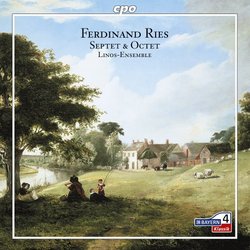| All Artists: Ferdinand Ries, Linos-Ensemble Title: Ferdinand Ries: Septet & Octet Members Wishing: 1 Total Copies: 0 Label: Cpo Records Original Release Date: 1/1/2005 Re-Release Date: 7/19/2005 Genre: Classical Styles: Chamber Music, Historical Periods, Classical (c.1770-1830) Number of Discs: 2 SwapaCD Credits: 2 UPC: 761203993727 |
Search - Ferdinand Ries, Linos-Ensemble :: Ferdinand Ries: Septet & Octet
CD Details |
CD ReviewsQuite Nice Chamber Music by One of Beethoven's Pupils J Scott Morrison | Middlebury VT, USA | 07/24/2005 (5 out of 5 stars) "Ferdinand Ries was one of Beethoven's few pupils. He was the son of Beethoven's old teacher in Bonn, and when the young man arrived in Vienna Beethoven received him graciously and gave him much help. For the next three years he took lessons from Beethoven and served as his secretary and copyist. In his time Ries was considered one of the best pianists around, and his music was honored as well. An almost certainly apocryphal remark attributed to Beethoven, 'He copies me too much,' nonetheless has some truth to it. However, his music is not entirely imitative and it has real merits.
The 'Grand Septuor' ('Grand Septet'), Op. 128 (1808) has an unusual instrumentation -- clarinet, 2 horns, violin, cello & double bass. (It also exists in a piano quintet arrangement made by Ries himself.) The two horns have much to do in the piece and for this reason there are often echoes of the 'hunting' wind band music so popular in that day. The double bass has a marvelous part -- reminiscent in some ways of the double bass in Schubert's 'Trout' Quintet -- and indeed it has the main melody in the second movement, 'Trauermarsch,' ('Funeral Marsch') which is a theme and variations. Also, not surprisingly considering Ries's own piano virtuosity, the piano part is scintillating -- lots of pearly runs and arpeggios -- and here is done beautifully by pianist Konstanze Eickhorst. This four movement work is worthy of standing beside similar works by Schubert and Beethoven, and I for one would love to hear it in concert. The 'Grand Otetto' ('Grand Octet'), Op. 128, is from eight years later in 1816, and the instrumentation is less unusual: clarinet, horn, bassoon, violin, viola, cello, double bass and piano. The piano has, as in the Septet, a virtuoso concertante part; the work is like a little piano concerto. It is in three movements, like a typical piano concerto -- fast, slow, fast, with the latter a rondo. The work's opening chord is a dominant seventh voiced just like the then-unusual opening chord of Beethoven's First Symphony, and one wonders if it was an homage to the Teacher. But then the majestic opening goes on to sound very much like the opening of Beethoven's Emperor Concerto. Yet, Ries has his own voice -- perhaps not as distinctive as Beethoven's, but recognizable to me now after having heard a fair amount of his music (primarily his symphonic works, also available from the growing list of Ries recordings on the ever-creative cpo label). The andantino middle movement is in ABA form (with a middle section in the minor) and reminds one of Mozart as much as Beethoven, not a bad model. The Rondo drops back just a bit in quality, but is lively and full of tuneful themes and syncopated accents. Again, Miss Eickhorst plays brilliantly. The other musicians in this CD are from the excellent German Linos Ensemble and special mention must be made of the deft playing of their first horn, Xiao-Min Han. This CD is worthy of investigation by those who like music from the late classical period. TT=55:23 Scott Morrison" |

